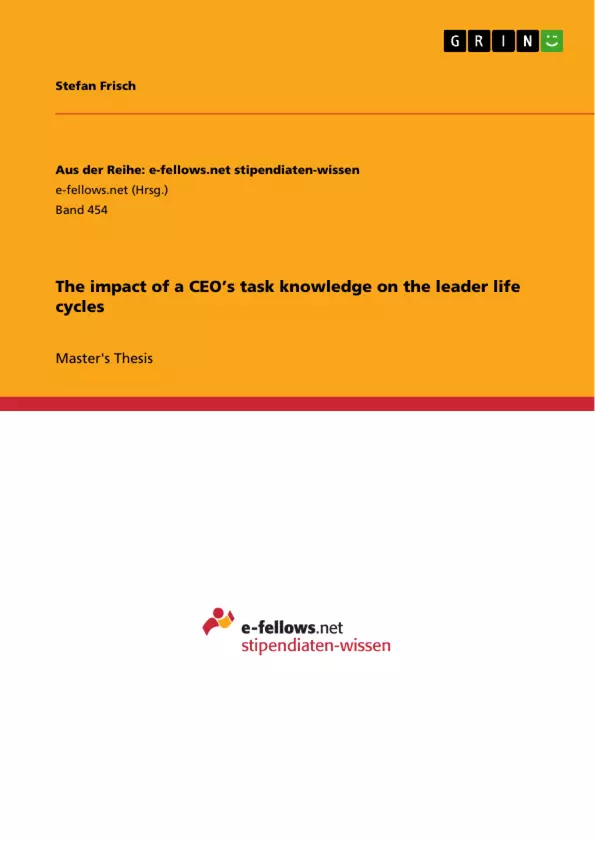Guided by the advancements of research on organizational learning, this thesis theoretically analyzes the impact of different dimensions of a CEO‟s task knowledge on company performance over the CEO life cycle. For this purpose, it attempts to conceptualize the previously fragmented literatures on company/industry based, experience based and personality based task knowledge into an integrated concept of task knowledge within the leader life cycle theory. As a result of this, consistent hypotheses on the positive influence of higher task knowledge and the concrete impact on the shape of the leader life cycle curve have been derived. Conclusively, the thesis might play a pioneering role within the progression from a pure demographic characteristics based methodology to direct psychological personality measures of an executive‟s cognitive base. The empirical validation deserves further attention.
Keywords: Leader life cycle theory; CEO life cycle; Task knowledge; Position-specific skills
Inhaltsverzeichnis (Table of Contents)
:- ABSTRACT
- TABLE OF CONTENTS
- TABLE OF FIGURES
- TABLE OF ABBREVIATIONS
- 1 INTRODUCTION
- 2 THEORETICAL FOUNDATIONS
- 2.1. A CEO’S TASKS AND ROLES
- 2.2. UPPER ECHELON THEORY
- 2.3. LEADER LIFE CYCLE THEORY
- 3 A THEORY OF TASK KNOWLEDGE
- 3.1. FROM ORGANIZATIONAL TO INDIVIDUAL KNOWLEDGE
- 3.2. PSYCHOLOGICAL DIMENSIONS OF PERSONALITY AND INDIVIDUAL TASK KNOWLEDGE
- 3.3. FRAMING TASK KNOWLEDGE TO THE CONTEXT OF A CEO
- 4 THE IMPACT OF TASK KNOWLEDGE ON PERFORMANCE OVER THE CEO LIFE CYCLE
- 4.1. A THEORETICAL CONSTRUCT OF A CEO’S TASK KNOWLEDGE
- 4.2. HYPOTHESES ON THE IMPACT OF TASK KNOWLEDGE ON THE LEADER LIFE CYCLE
- 5 TRANSLATION OF TASK KNOWLEDGE INTO EMPIRICALLY TESTABLE VARIABLES
- 5.1. VARIABLE DEFINITION
- 5.2. DISCUSSION OF LIMITATIONS AND IMPLICATIONS
- 6 CONCLUSION AND OUTLOOK
- TABLE OF APPENDIXES
- APPENDIXES
- LITERATURE
Zielsetzung und Themenschwerpunkte (Objectives and Key Themes)
: This thesis explores the impact of a CEO's task knowledge on company performance over the CEO's life cycle. The main objective is to integrate various theoretical frameworks, including organizational learning, leadership, and upper echelon theories, to develop a comprehensive understanding of the role of task knowledge within the leader life cycle theory. Key themes examined include: * The nature and dimensions of task knowledge in the context of a CEO * The relationship between different aspects of task knowledge and company performance * The influence of moderating variables on the impact of task knowledge on performance * The implications of the findings for both theoretical and practical applications of leader life cycle theoryZusammenfassung der Kapitel (Chapter Summaries)
: This section will provide summaries of the main themes and arguments presented in the chapters of the thesis, excluding content from the conclusion or any sections containing major spoilers. * **Chapter 1: Introduction** - This chapter introduces the research question, outlining the importance of understanding the role of task knowledge in the context of the leader life cycle theory. It highlights the limitations of existing research and sets out the objectives of the study. * **Chapter 2: Theoretical Foundations** - This chapter reviews key theoretical frameworks that provide the foundation for the study, including the upper echelon theory and the leader life cycle theory. It explores the roles and tasks of a CEO and examines the relationship between CEO characteristics and company performance. * **Chapter 3: A Theory of Task Knowledge** - This chapter develops a comprehensive theoretical construct of task knowledge, integrating insights from organizational learning, leadership, and psychological perspectives. It discusses the different dimensions of task knowledge, including firm/industry-based knowledge, experience-based knowledge, and role-based knowledge. * **Chapter 4: The Impact of Task Knowledge on Performance Over the CEO Life Cycle** - This chapter examines the theoretical implications of the proposed construct of task knowledge for the leader life cycle theory. It proposes hypotheses about how different aspects of task knowledge affect company performance over the CEO's tenure and discusses the influence of moderating variables. * **Chapter 5: Translation of Task Knowledge into Empirically Testable Variables** - This chapter explores the practical considerations for operationalizing the theoretical constructs of task knowledge into empirically measurable variables. It proposes methods for measuring different dimensions of task knowledge and discusses potential limitations and implications of the proposed framework.Schlüsselwörter (Keywords)
: This thesis focuses on the interplay of **leader life cycle theory**, **CEO life cycle**, **task knowledge**, and **position-specific skills**. It seeks to advance the field of CEO research by incorporating a more nuanced and comprehensive understanding of the impact of a CEO's cognitive base on company performance, moving away from solely demographic characteristics to encompass direct psychological measures of an executive's personality.Frequently Asked Questions
How does a CEO's task knowledge affect company performance?
The thesis argues that higher task knowledge positively influences company performance throughout the CEO's life cycle, affecting the shape of the performance curve.
What are the dimensions of task knowledge?
Task knowledge is categorized into firm/industry-based knowledge, experience-based knowledge, and personality-based cognitive foundations.
What is the "Leader Life Cycle Theory"?
It is a theory that examines the evolution of a leader's effectiveness and the company's performance over the duration of the leader's tenure in a specific position.
How does this research move beyond demographic data?
Instead of just looking at age or education, this study attempts to measure direct psychological personality traits and the executive's specific cognitive base.
What is the "Upper Echelon Theory"?
This theory suggests that organizational outcomes are partially predicted by the background characteristics and cognitive biases of the top management team.
What are position-specific skills for a CEO?
They refer to the unique set of knowledge and abilities required to effectively manage a specific company within its unique industry context.
- Arbeit zitieren
- Stefan Frisch (Autor:in), 2011, The impact of a CEO’s task knowledge on the leader life cycles, München, GRIN Verlag, https://www.grin.com/document/196180



